Trans-Atlantic Relations | 07.04.2009
Obama's first European report card: good effort but could try harder
The British were more concerned about Michelle Obama draping an affectionate arm around the Queen; the French stopped moaning about Turkey and the proposed US injection of huge amounts of cash into the world economy just long enough to trade fashion gossip on the first lady's meeting with Carla Bruni-Sarkozy, while the Germans merely sulked and turned a deaf ear to anything with the word "Afghanistan" in it.
But amid all the talk of designer gowns, inappropriate touching of monarchs and minor tantrums, most experts say that President Barack Obama's first European tour was, on the whole, a political success.
"It was very successful but it is still to be seen if that success will endure," Stefani Weiss, project manager for European Foreign and Security Policy at the Bertelsmann Foundation, told Deutsche Welle. "It was outstandingly successful in winning over the crowds in Europe which all seemed to appreciate Obama's new charismatic style of politics; the public appreciated his vision and dedication to work for a better world. In regards to the politicians, they also liked the new style, but maybe they are starting to show a little ambivalence towards it."
"Obama's visit was reasonably successful considering he still doesn't have half his national security team in place, and a lot of the policies required to develop what US policy should be towards Europe haven't been fleshed out," said Daniel Korski, senior policy fellow on transatlantic relations at the European Center for Foreign Relations. "More came out of the visit than was expected and Obama played a key role in all the negotiations. Okay, so we're not out of the financial crisis, but none of the expected spats that everyone was worried about actually materialized."
Europeans eager for a new start with the US
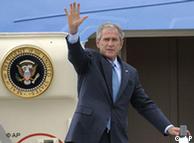 Bildunterschrift: Großansicht des Bildes mit der Bildunterschrift: Bush had few friends in Europe during his presidency
Bildunterschrift: Großansicht des Bildes mit der Bildunterschrift: Bush had few friends in Europe during his presidency
European observers were particularly interested as to how the new president approached his negotiations with their leaders, baring in mind how divisive his predecessor's policies were on the continent. But although Obama charmed Europe's leaders and teased them with hints of things to come, he failed to deliver any assurances on how his administration will approach US-Europe relations in the future.
"I think it's too early to tell how the Obama administration is going to approach relations with the EU," said Korski. "Some of the bandwidth of US-EU relations certainly needs to be beefed-up and we have yet to see the kind of steps required to do that. We're still in the very early days of this administration and it'll take some time before they can fully develop what's needed for the US-EU relationship."
Weiss believes that Obama showed a real commitment to the transatlantic alliance, and although there were no concrete declarations, she was optimistic on the future of relations.
"The great rifts have not been overcome, but he has the right approach and it seems that, after a long time, the Europeans and US can work towards a better world together," she said. "However, he hasn't solved a single problem yet. But through his approach he has overcome some distrust, and the Europeans are prepared to work with him. Also, Obama is very demanding and he has put the Europeans under stress to deliver. They can't stand by and argue anymore, they have to do their work."
Obama gets a taste of 'Old Europe'
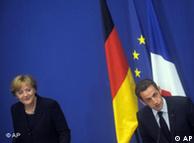 Bildunterschrift: Großansicht des Bildes mit der Bildunterschrift: Merkel and Sarkozy had issues with some Obama policies
Bildunterschrift: Großansicht des Bildes mit der Bildunterschrift: Merkel and Sarkozy had issues with some Obama policies
Despite his best efforts to reassure the Europeans that the new boss is nothing like the old boss, Obama did manage to rile those countries which had been the bane of Bush's tenure, those countries which former US Secretary of Defense Donald Rumsfeld once infamously referred to as "Old Europe."
But while France and Germany stamped their feet over stimulus packages and Obama's support for Turkey's bid for EU membership, experts reject the idea of a return to the dark days of the Bush administration's relations with Paris and Berlin.
"I don't think Obama will have the same type of problems as Bush did with France and Germany unless he insists on absolute conformity with American policies - and the tone of his visit suggests that he won't," said Dana Allin, senior fellow on transatlantic affairs at the International Institute for Strategic Studies.
Daniel Korski agrees. "I think it'll be a fundamentally different relationship to that between Europe and the Bush administration," he said. "But saying that, we saw France and Germany riled by Obama's speech about the role of Turkey in the EU, so there will be tension. The fact is that the US has seen itself as a European power for the past 60 years. What we don't know is whether Obama still sees the US as a European power, and if he doesn't, then what does that mean for the kind of relations we need to have?”
Another area of potential conflict between Europe and Washington materialized during one of the Obama tour's most surprising successes. While extending a hand to Russia, some saw Obama turning his back on European needs and interests, and Europe's relations with Moscow and its neighbors.
Reaching out to Russia
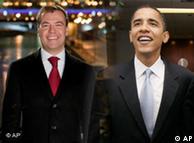 Bildunterschrift: Großansicht des Bildes mit der Bildunterschrift: Medvedev and Obama reached an historic agreement
Bildunterschrift: Großansicht des Bildes mit der Bildunterschrift: Medvedev and Obama reached an historic agreement
"Obama wants to have a functioning relationship with Moscow in order to solve global problems," said Korski. "They include Iran, nuclear proliferation in general and getting logistical support for NATO's Afghan mission, so all the conversations he had with Medvedev went in that direction. However, while the US wants to reset the relationship with Moscow, this may lead to problems with the Europeans. US rapprochement with Russia may come at a price for European interests which are more tied to the neighborhood."
Even so, Obama's offer of an olive branch to his Russian counterpart was one of the diplomatic highlights of his European mission.
"Obama is following the strategy of diplomacy where he's not trying to start with a confrontation on the most divisive issues, but he's trying to find areas where there are common interests and goals and to get back into the habit of cooperating on these," said Allin. "The US and Russia have committed themselves to finding a replacement to the arms control treaty which is about to expire. That was the most substantial and important thing to come out of Obama's meeting with Medvedev. The atmosphere was good, but they also came out with something tangible, a pledge to pursue a nuclear-free world through a new arms control agreement."
However, Allin stresses, this does not mean that the US and Russia have resolved other contentious issues such as NATO's eastern enlargement or the planned US missile defense shield in Europe.
While the US president was widely praised for his approach to Russia and his contribution to the G20 financial discussions in London, Obama's first NATO summit was seen as more of a good start than a reason to celebrate.
Obama faced with the challenges of NATO
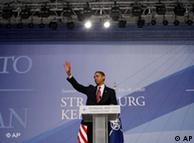 Bildunterschrift: Großansicht des Bildes mit der Bildunterschrift: Obama made a good show at NATO but faces a tough job
Bildunterschrift: Großansicht des Bildes mit der Bildunterschrift: Obama made a good show at NATO but faces a tough job
"Obama will have come away from the NATO summit with the impression that the Europeans are at least willing to give it a try and work with the US in NATO, so he should be proud of what he achieved there," said Stefani Weiss. "He showed he wasn't naive. NATO is an organization with 28 members and it is hugely difficult to accommodate everyone's interests. I think Obama showed that he gets that."
"At NATO, I think he had more success on the Afghanistan issue, at least rhetorically, than people expected," Korski said. "The mood music was positive, except for that last minute scramble with the Turks over the appointment of Anders Fogh Rasmussen as the new general secretary of NATO. That could have been handled better."
Dana Allin believes that Obama will find that future dealings with NATO, especially with its European members, may not always be so cordial.
"There may be areas of tension on military issues in Afghanistan, but Obama probably got his answer to that when he visited as a candidate in July last year and learned that there wasn't a lot more that the Europeans, and Germany in particular, were willing or able to do," he said. "But it could still cause some problems if US efforts increase and European efforts stay more or less flat. Saying that, the Europeans are still hanging in there and taking casualties, so maybe Afghanistan won't be as dramatic an issue between this administration and Europe as everyone thinks."
Author: Nick Amies
Editor: Nancy Isenson
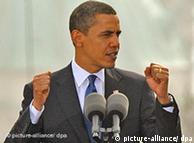

No comments:
Post a Comment